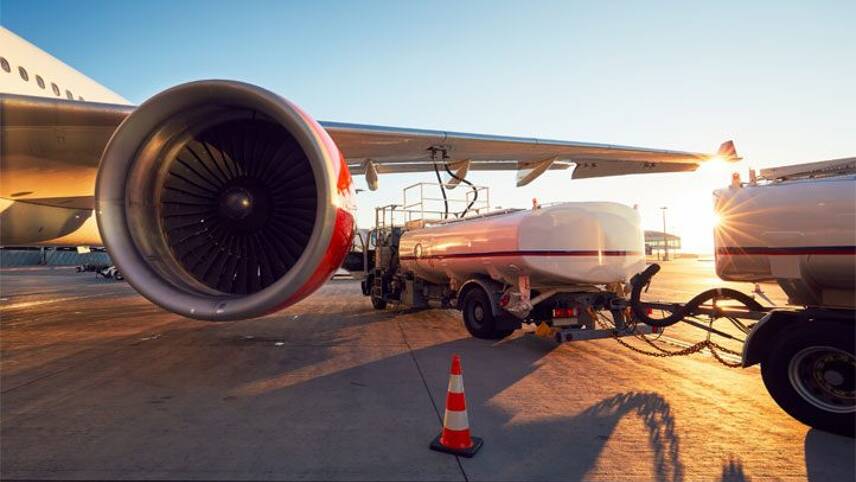Register for free and continue reading
Join our growing army of changemakers and get unlimited access to our premium content

Under current regulations
Published on 14 July after months of Covid-19 related delays, the Transport Decarbonisation Plan outlined the Government’s approach to delivering a net-zero domestic aviation sector by 2040 and net-zero international aviation by 2050. In terms of emissions from planes, Sustainable Aviation Fuels (SAFs) were positioned as a key solution, with the Department for Transport (DfT) stating that they are likely to reach commercial maturity sooner than electric solutions.
Building on the Plan, the DfT has launched a consultation on the need for a SAF mandate. It is floating a requirement for jet fuel producers to ensure that at least 10% of their production annually is SAF by 2030, rising to 75% by 2050. These targets could reduce the sector’s annual emissions by up to 23 megatonnes from 2050, the DfT estimates.
The mandate would be separate to the existing Renewable Transport Fuel Obligation (RTFO), with the Department stating that a “more comprehensive policy framework is needed in order to accelerate SAF deployment and truly capture the environmental benefits and green jobs the sector can deliver”. Aviation fuel would become ineligible for RTFO certificates once the SAF mandate is in place.
The proposed definition of SAF is a fuel that delivers at least a 60% reduction in life-cycle emissions compared to kerosene. Waste-derived biofuels are included in the definition, as are fuels of non-biological origin, SAF from nuclear energy and recycled carbon fuels. Biofuel crops are excluded, as is grey (fossil-fuelled) hydrogen.
“We acknowledge high targets will be contingent on multiple technology and policy developments that could unlock a very rapid roll-out of several SAF plants in the short term, the quick commercialisation of SAF technology not yet proven at scale and the certification of new production pathways,” the consultation documents state. “To take into account these uncertainties, we welcome views on the right trade-off between ambition and deliverability at this stage.”
“Given the level of complexity associated with developing policy on SAF support, we anticipate that this consultation is likely to be followed by a second consultation which both reflects findings from the first and addresses more fully the details of administering a mandate.”
The consultation will run until 19 September.
Green Fuels, Green Skies Competition
The DfT opened the consultation as it revealed the companies shortlisted to receive a share of a £15m competition funding pot designed to support the development of new SAF production plans using innovative methods. The funding forms part of the £20m announced for aviation and shipping in the Ten Point Plan in 2020.
Eight companies have secured a place on the shortlist for the competition, called ‘Green Fuels, Green Skies’. Methods of SAF production include deriving CO2 from the air and mixing it with hydrogen extracted from water using electrolysis; deriving alcohol from flue gases from heavy industry; converting household waste and converting sewage.
Shortlisted projects include Velocys’ waste-to-jet-fuel plant in North East Lincolnshire. British Airways is supporting the scheme and North East Lincolnshire Council has granted planning permission, but the project faced a setback earlier this year when Shell pulled out, stating that the business case for new SAF facilities was stronger in Canada than the UK.
The other shortlisted companies are Nova Pangaea Technologies; Lanzatech; Carbon Engineering; Green Fuels Research; Fulcrum BioEnergy; Advanced Biofuel Solutions and alfanar Energy.
The DfT claims that SAF production in the UK could generate between £700m and £1.66bn in economic benefits annually and create 11,000 green jobs by 2040. It believes that the Green Fuels, Green Skies funding alone will create more than 1,000 new jobs.
While the DfT’s approach to decarbonising aviation is broadly in line with that of the UK Sustainable Aviation coalition, which is prioritising efficient planes with SAF use over electric alternatives and refuses to cap passenger numbers, some have argued that this is the wrong approach. The UK Government’s Climate Change Committee (CCC) recommended that, along with SAF, more should be done to scale electric aircraft and to cap demand growth. In fact, the CCC’s most optimistic for national use of SAFs is 7% by 2030.
Sarah George


This is NOT "sustainable" – puts just the same CO2 in the atmosphere as jet-kero! Stop deceiving the public.